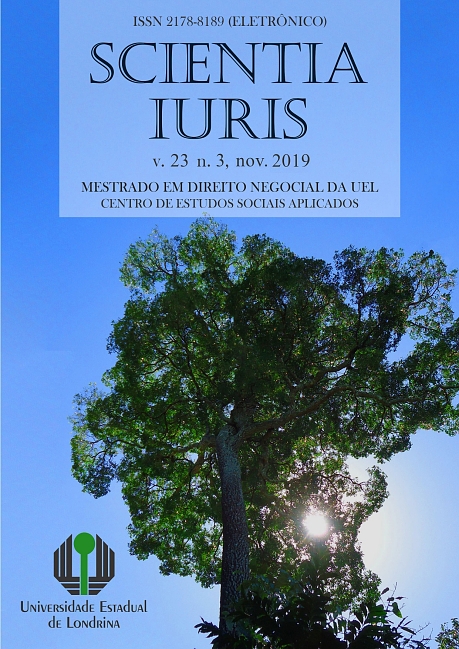Alternative solution of conflicts: rent a judge as access to justice and effectiveness of fundamental rights
DOI:
https://doi.org/10.5433/2178-8189.2019v23n3p24Keywords:
: Conflict resolution. Access to justice. Fundamental rights.Abstract
This article aims at analyzing the alternative technique of conflict resolution little known in Brazil, the so - called Rent a Judge, which originated in California in the United States
and was founded by three lawyers working in a complex case against a medical practice. The technique innovated the North American
conflict resolution system bringing more agility and procedural economy to the resolutions of the lids. The article, through its methodology of bibliographic and documentary research, after its introduction, begins with a chapter demonstrating how access to justice became a fundamental right and how it was installed in the Brazilian legal system. It then presents three models of alternative forms of conflict resolution in Brazil, exposing their characteristics and advantages and, verifying in what way, the legal order appropriates these techniques. In the last chapter, the American method denoted Rent a Judge, from its inception to its specificities, will be analyzed, demonstrating its pacifying way of solving internal disputes as an instrument of access to justice and enforcer of fundamental rights.
Downloads
References
ALMEIDA, Guilherme de Assis. APOLINÁRIO, Silvia Menicuccio de Oliveira Selmi. Direitos
humanos. São Paulo: Atlas, 2009.
ÁLVAREZ, Gladys S. Mediación y justicia. Buenos Aires: Delpalma, 1996.
ANNONI, Danielle. O direito humano de acesso à justiça do Brasil. Porto Alegre: Sérgio
Antonio Fabris Editor, 2008.
CONSELHO NACIONAL DE JUSTIÇA. Justiça em números. 2017. Disponível em: http://
www.cnj.jus.br/files/conteudo/arquivo/2017/12/b60a659e5d5cb79337945c1dd137496c.pdf.
Acesso em: 12 dez. 2017.
BRASIL. [Constituição (1988)]. Constituição da República Federativa do Brasil. Brasília:
Presidência da República, 1988. Disponível em: http://www.planalto.gov.br/ccivil_03/
constituicao/constituicao.htm. Acesso em: 11 dez. 2017.
BRASIL. Lei nº 9.099, de 26 de Setembro de 1995. Dispõe sobre os Juizados Especiais Cíveis
e Criminais e dá outras providências. Brasília: Presidência da República, 1995. Disponível em:
http://www.planalto.gov.br/ccivil_03/leis/L9099.htm. Acesso em: 12 dez. 2017.
CACHAPUZ, Rozane da Rosa. Arbitragem: alguns aspectos do processo e do procedimento na
lei nÀ 9.307/96. São Paulo: Editora de Direito, 2000.
CAPPELLETTI, Mauro; GARTH, Bryant. Acesso à justiça. Porto Alegre: Safe, 1988.
CARMONA, Carlos Alberto. Arbitragem e processo: um comentário à Lei nº. 9.307/96. 2. ed.
São Paulo: Atlas, 2004.
DALLARI, Dalmo de Abreu. Direitos humanos e cidadania. São Paulo: ed. Moderna, 1998.
FRADE, Catarina. A resolução alternativa de litígios e o acesso à justiça: A mediação do
sobreendividamento. Revista Crítica de Ciências Sociais, Coimbra, v. 65. p. 107-128, 2003.
HASAN, Cigdem. Rent-a-judge. 2009. Thesis (PhD of Law) - University of Lund, Lund. 2009.
LAUREN, Paul Gordon. The evolution of human rights: vision seen. 2. ed. Philadelphia:
University of Pennsylvania Press. 2003.
MACKLEM, Patrick. Human rights in international law: three generations or one? London Review of International Law, London, v. 3, n. 1, p. 61-92, 2015.
MARASCA, Elisângela Nedel. Meios alternativos de solução de conflitos como forma de acesso
à justiça e efetivação da cidadania. Direito em Debate, Santa Rosa, v. 16, p. 27-28, 2007.
MAZZUOLI, Valerio de Oliveira. Curso de direitos humanos. São Paulo: Editora Método,
MORAES, Alexandre de. Direitos humanos fundamentais. São Paulo: Atlas, 2006.
MORAIS, José Luiz Bolzan de. Mediação e arbitragem: alternativas à jurisdição. Porto Alegre:
Livraria do Advogado, 1999.
MORGADO, Patrícia Lima. Práticas pedagógicas e saberes docentes na educação em direitos
humanos. 2005. Disponível em: http://www.anped.org.br/25/patriciamorgadot04.rtf/. Acesso em
dez. 2017.
PANTOJA, Fernanda Medina; ALMEIDA, Rafael Alves de. Os métodos "alternativos" de
soluções de conflitos (ADRS). In: ALMEIDA, Tania; PELAJO, Samantha; JONATHAN, Eva.
Mediação de conflitos: para iniciantes, participantes e docentes. Salvador: JusPodivm, 2016. p.
-69.
SALES, Lília Maia de Morais. Justiça e mediação de conflitos. Belo Horizonte: Del
Rey, 2004.
SAMPAIO, José Adércio Leite. Direitos fundamentais. 2. ed. Belo Horizonte: Editora Del Rey,
SARKIN, Jeremy. The historical origins, convergence and interrelationship of international
human rights law, international humanitarian law, international criminal law and
public international law and their application from at least the nineteenth century. 2007.
Disponível em: https://papers.ssrn.com/sol3/papers.cfm?abstract_id=1304613. Acesso em: 12
dez. 2017.
SERPA, Maria de Nazareth. Teoria e prática da mediação de conflitos. Rio de Janeiro: Lúmen
Júris, 1999.
SHELTON, Dinah L. An introduction to the history of international human rights law. 2007.
Disponível em: https://papers.ssrn.com/sol3/papers.cfm?abstract_id=1010489. Acesso em: 12
dez. 2017.
SILVA, Antônio Hélio. Arbitragem, mediação e conciliação. In: LEITE, Eduardo de Oliveira.
Grandes temas da atualidade: mediação arbitragem e conciliação. Rio de Janeiro, RJ: Forense.
p. 17-38.
TERRY, Sara. Rent-a-judge: a fast way to 'day in court'. The Christian Science Monitor, Los
Angeles, 9 fev. 1982.
STIPANOWICH, Thomas J. The multi-door contract and other possibilities. Journal on Dispute
Resolution, Ohio, n. 13, p. 303-328, 1998.
WEBER, Max. Conceitos básicos de sociologia. São Paulo: Centauro, 2002.
Downloads
Published
How to Cite
Issue
Section
License
Copyright (c) 2022 Scientia Iuris

This work is licensed under a Creative Commons Attribution 4.0 International License.
The journal reserves the right to modify, in the original text of the submitted article, normative, spelling and grammatical mistakes in order to maintain the cultured standard of language and the credibility of the journal. The journal will respect the authors' writing style. Changes, corrections or suggestions of conceptual order will be sent to the authors, when necessary. In such cases, the articles will be re-examined. The final exams will not be sent to the authors. The published works become the property of the journal, in other words, its total or partial reprinting is subject to the express authorization of the journal. In all subsequent citations, the original source of publication shall be cited and in the case of Photographic Speeches, shall be approved by the original author. The opinions expressed by the authors of the journal's articles are of their sole responsibility.

















